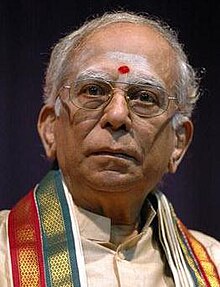Lalgudi Jayaraman
| Lalgudi Jayaraman | |
|---|---|
 |
|
| Background information | |
| Born |
17 September 1930 Chennai |
| Died | 22 April 2013 (aged 82) |
| Genres | indian classical music, jazz fusion |
| Occupation(s) | Violinist, composer, |
| Instruments | Violin, percussion, synthesizers |
| Years active | 1942–2013 |
Lalgudi Gopala Iyer Jayaraman (17 September 1930 – 22 April 2013) was an Indian Carnatic violinist, vocalist and composer. His awards included the Padma Bhushan by the Government of India in 2001.
His disciples included his two children Lalgudi G. J. R. Krishnan, Lalgudi Vijayalakshmi, renowned musician S P Ramh (grandson of Shri. G.N. Dandapani Iyer), renowned Harikatha exponent Vishaka Hari, Saketharaman, Vittal Ramamurthy, Dr. N. Shashidhar, the leading Vainika Srikanth Chary and the Academy Award nominated Bombay Jayashri Ramnath.
Born in the lineage of a disciple of the saint musician Thyagaraja, Lalgudi Jayaraman inherited the essence of Carnatic music from his versatile father, V. R. Gopala Iyer, who trained him. Gopala Iyer, a martinet, enforced traits of intense focus and discipline in the young Jayaraman through rigorous lessons. Though a harsh father and guru, Gopala Iyer would not allow the young Jayaraman to even sharpen pencils, believing that his tender fingers were too precious.
At the age of 12, he started his musical career as an accompanying violinist to Carnatic musicians before rising as a prominent soloist.
He expanded the style of violin playing by inventing a whole new technique that is designed to best suit the needs of Indian Classical Music and establishing a unique style that came to be known as Lalgudi Bani'. Jayaraman composed several 'kritis', 'tillanas' and 'varnams' and dance compositions, which are a blend of raga, bhava, rhythm and lyrical beauty. Lalgudi's instrumental talent comes to the fore in the form of lyrical excellence. He brought the most-sought-after vocal style into violin, and his renditions exhibit knowledge of lyrical content of the compositions. Lalgudi actively and scientifically learned to self-critique his performances and dutifully wrote detailed reviews after each concert, a habit encouraged by his father and guru. He was loath to experiment on stage in his solo concerts and almost always planned to the last detail, leading a certain critic to tout them as being intellectual rather than emotional in spirit, but Lalgudi's spontaneity and innate musical genius were often seen when he accompanied leading vocalists.
...
Wikipedia
